李克强在第12届中欧工商峰会上的演讲
中国政府网 2017-06-05 11:21

国务院总理李克强当地时间6月2日上午在布鲁塞尔出席第12届中欧工商峰会,并发表题为《共同奏响高水平互利合作新乐章》的演讲。
 |
Chinese Premier Li Keqiang delivers a keynote speech at the 12th EU-China Business Summit in Brussels on June 2, 2017. [Photo provided to chinadaily.com.cn] |
演讲全文如下:
共同奏响高水平互利合作新乐章
Work Together to Embrace a New Era of High-standard and Mutually Beneficial Cooperation
——在第12届中欧工商峰会上的演讲
(2017年6月2日,布鲁塞尔)
中华人民共和国国务院总理 李克强
Speech by H.E. Li Keqiang
Premier of the State Council of the People’ s Republic of China
At the 12th China-EU Business Summit
Brussels, 2 June 2017
尊敬的容克主席,
President Juncker,
女士们、先生们、朋友们:
Ladies and Gentlemen,Friends,
很高兴来到美丽的布鲁塞尔,出席中欧工商峰会。我谨代表中国政府,对峰会的成功举办表示祝贺,向长期致力于中欧友好合作的各界人士致以敬意!
It gives me great pleasure to come to the beautiful city of Brussels and join you for the China-EU Business Summit. On behalf of the Chinese government, I would like to congratulate you on the success of the Business Summit and pay tribute to people from all sectors who have long been committed to promoting friendship and cooperation between China and Europe.
比利时有欧洲“十字路口”之称,布鲁塞尔是欧洲的“心脏”。在这里可以感受到欧洲跳动的“脉搏”,也便于清晰观察世界局势的走向。当前,世界经济贸易出现积极变化,乐观情绪上升,但增长基础并不牢固,不确定性仍然较多。经济全球化在曲折中发展,地区冲突、恐怖主义、难民移民大规模流动等挑战依然严峻。作为维护世界和平与促进共同发展的两大力量,中欧如何应对纷繁复杂的局势,备受各方瞩目。我此访的重要目的,是推动中欧凝聚共识、增进互信、深化合作,以中欧双边关系的稳定性、共同维护多边主义的一贯性,应对国际形势的不确定性。
Belgium is known as the “crossroads” of Europe and Brussels is at the “heart” of Europe. From here, one can feel the “pulse” of this continent and see the direction of international evolution. The global economy and trade are now showing positive changes which bolster our sense of optimism, but the foundation for continued growth is not yet secure and uncertainties still abound. Economic globalization is encountering difficulties. Challenges such as regional conflicts, terrorism and large movement of refugees and migrants remain acute.As two leading players for promoting world peace and common development, how China and the EU respond to such a complex situation will be keenly watched around the world. My visit to Europe is aimed at building consensus, increasing mutual trust and enhancing cooperation between China and Europe to counter international uncertainties with a stable China-EU relationship and our consistent commitment to multilateralism.
中国坚定不移支持欧洲团结繁荣稳定。欧洲是发达国家最集中的大陆,欧盟是世界政治经济舞台上的重要一极。一个团结、稳定、繁荣、开放的欧洲,一个强大的欧元,关乎欧洲各国人民的根本福祉,有利于世界多极化、经济全球化、文明多样化。中国一直从战略高度看待和重视欧盟,把发展对欧关系作为外交的优先方向之一。无论欧洲形势和国际风云如何变化,中国都愿与欧方深化全面战略伙伴关系,一如既往地坚定支持欧洲一体化进程,也尊重欧洲国家自主选择发展道路。我们坚信欧洲有智慧有能力克服眼前困难,实现新的发展与进步。
China firmly supports a united, prosperous and stable Europe. Europe is home to the largest number of developed countries and the EU is an important pole in the world political and economic arena. A united, stable, prosperous and open Europe and a strong euro serve the fundamental interests of all European peoples and contribute to world multipolarity, economic globalization and diversity of civilizations. China has all along placed strategic importance on its relations with the EU and considers the EU as a diplomatic priority. No matter how the situation in Europe and the world evolves, China will always be ready to deepen its comprehensive strategic partnership with the EU. We will continue to give firm support to the European integration process and respect the development paths chosen by European countries themselves. We have full confidence that Europe has the wisdom and capability to overcome current difficulties and achieve new progress in development.
中欧应共同坚持经济全球化的大方向。今年年初,习近平主席在达沃斯世界经济论坛发表重要演讲,阐述了中国坚定维护自由贸易,共同建设开放、包容、普惠、平衡、共赢的经济全球化的主张,提振了人们对经济全球化的信心。以贸易和投资自由化便利化为代表的经济全球化,过去是、现在是、将来仍然是世界经济持续发展的重要动力。世界上不存在有百利无一弊的灵丹妙药,经济全球化也会带来这样那样的问题。我们要正视这些问题,采取措施加以解决、减少负面影响,但不能因噎废食,“踩刹车”、“挂倒挡”不可取,也不符合历史潮流。当前的迫切任务,是坚持自由贸易,重振贸易和投资两大引擎,推动世界经济迈上稳定复苏的轨道,使经济全球化惠及更多国家、更多人群。中欧都是自由贸易的受益者,也应是自由贸易的坚定维护者。现在有人提出“公平贸易”问题。事实上,自由贸易是贸易公平的前提,限制贸易自由带不来贸易公平;公平原则是自由贸易的应有之义,不公平的贸易也无法持续。公平贸易应体现多边性、包容性、非歧视性等原则,不能将单边规则强加于人,也不能将公平贸易政治化。
China and the EU need to remain committed to the overall direction of economic globalization. In his speech at the World Economic Forum in Davos earlier this year, President Xi Jinping underscored China’s commitment to upholding free trade and put forward the proposition of making economic globalization more open, inclusive, balanced and beneficial to all. His message has given a boost to people’s confidence in economic globalization. Powered by trade and investment liberalization and facilitation, economic globalization has always been and will continue to be a major driver for sustained global growth. Just as there is no panacea in the world which does not involve any pain, economic globalization is not problem-free. We need to face up to these problems and make efforts to address and alleviate their adverse impacts. In any case, one cannot stop eating for fear of choking, to apply the brakes on economic globalization or try to reverse course is neither advisable nor consistent with the historical trend. The most urgent task now is to uphold free trade, re-energize trade and investment, push the global economy onto the track of steady recovery and spread the benefits of economic globalization to more countries and communities. Both being beneficiaries of free trade, China and the EU should also be its staunch advocates. Some people raised the issue of fair trade. As a matter of fact, free trade is the premise of fair trade. Restricting free trade will not make trade fairer. Fairness is an inherent feature of free trade, and trade, if not fair, will not be sustainable. Fair trade should reflect multilateral, inclusive and non-discriminatory principles. Attempting to impose unilateral rules or making fair trade a political issue will not lead anywhere.
中欧应共同维护以规则为基础的多边经贸秩序。以世贸组织为核心的多边贸易体制,是经济全球化的重要制度保障,权威和效力应得到尊重和维护。即便现行多边规则有不适应形势变化的地方,大家可以共同协商加以完善,但不能无视既定规则,更不能推倒重来。加入世贸组织以来,中国全面履行了各项承诺,其他成员方也应该这样做。欧盟作为现代国际经贸规则的主要创设者之一,也是区域经济合作的标杆,遵守多边规则、维护多边体系,符合欧盟自身的利益。《中国加入世界贸易组织议定书》第15条是“日落条款”,按期无条件终止对华反倾销调查“替代国”做法,是各成员方的国际条约义务。希望欧盟在履行第15条义务问题上,向世界释放维护多边体系和规则的积极信号。如果世贸组织各成员都“选择性”遵守国际规则,容易引发连锁反应,动摇多边秩序的根基,最终不会有赢家。
China and the EU need to jointly uphold the rules-based multilateral economic and trade order. The multilateral trading regime with the WTO at its core provides important institutional safeguard for economic globalization. Its authority and efficacy should be respected and upheld. Even though some of the multilateral rules may no longer reflect changing circumstances, we can all engage in consultations on improving them. No one should turn a blind eye to these rules, still less try to start anew. China has fully honored its commitments as a member of the WTO, and other members are supposed to do the same. The EU is a leading maker of modern economic and trade rules and a standard-bearer of regional economic cooperation. As such, it is in the interests of the EU to observe multilateral rules and uphold the multilateral system. Article 15 of China’s WTO Accession Protocol is a “sunset clause,” which obliges all members to unconditionally cease, upon the date of its expiry, the application of analogue country methodology in their anti-dumping investigations against China. On the issue of complying with Article 15 obligations, we hope the EU will send a positive signal of upholding the multilateral system and rules. If all WTO members chose to observe international rules in a selective way, this would trigger cycles of reactions and undercut the foundation of the multilateral order. No one will emerge as a winner eventually.
中欧应共同维护和平稳定的发展环境。和平、发展、开放、合作多位一体、密不可分。没有和平稳定的环境,一切都无从谈起。历史上,中欧人民都曾饱受战乱之苦,更加懂得和平的珍贵。世界保持70多年的和平来之不易,应当倍加珍惜。中欧应坚定维护以《联合国宪章》为基础的国际关系准则,坚持政治解决热点问题的方向,在国际社会广泛共识的基础上应对全球性挑战,促进世界持久和平与共同发展。当前朝鲜半岛形势高度敏感复杂,中方坚持实现半岛无核化目标,坚持维护半岛和地区和平稳定,坚持通过对话协商解决问题,实践证明这是负责任的做法。叙利亚问题久拖未决,令人担忧。国际社会应尊重叙利亚人民选择自己的发展道路,共同推动叙利亚问题早日实现政治解决。恐怖主义是人类公敌,中欧都是受害者,对一切形式的恐怖主义必须予以坚决打击。
China and the EU need to jointly maintain a peaceful and stable environment for development. Peace, development, openness and cooperation are interconnected and inseparable. Without peace and stability, nothing could be achieved. Having both suffered from the miseries of war, the people of China and Europe deeply value peace. The prevalent trend for peace in the world for the past 70 years and more has been no mean feat and should be all the more cherished. China and the EU need to firmly uphold the norms governing international relations underpinned by the UN Charter, never waver from political settlement of hotspot issues, and address global challenges on the basis of consensus-building, in a joint effort to promote durable peace and common development of the world. The situation on the Korean Peninsula is highly sensitive and complex. China has remained firmly committed to denuclearization, to the maintenance of peace and stability on the Peninsula and in the region and to resolution through dialogue and consultation. Past experience has shown that this is the responsible approach to take. Protracted conflict in Syria has been a source of concern. The international community should respect the choice of development path made by the Syrian people and work for the early political settlement of the issue. Terrorism is a common enemy to all mankind, and both China and Europe have suffered enormously from this scourge. Terrorism in whatever form must be combated with full resolve.
女士们、先生们!
Ladies and Gentlemen,
中欧关系走过40多年历程,逐步迈入成熟稳健的发展轨道。2014年,习近平主席访问欧盟期间,提出共同打造中欧和平、增长、改革、文明四大伙伴关系,为中欧合作注入了新的强大动力。在双方各界人士共同努力下,中欧全方位合作稳步推进,经贸合作更是硕果累累。欧盟长期是中国第一大贸易伙伴、第一大技术来源地和重要外资来源地,中国是欧盟第二大贸易伙伴。据中方统计,国际金融危机以来,中国对欧盟出口年均增长1.8%,欧盟对华出口年均增长5.8%。现在每分钟双边贸易额超过100万美元,每两天贸易额相当于建交时一年的贸易额,每周有600多个航班往返于中欧之间,每月中欧班列运行多达150列。中欧合作是优势互补的必然结果,双方人民都从中受益。来自欧洲的资金、技术和管理经验,助力中国工业化进程。中国物美价廉的商品为欧洲家庭节约不少开支,中国广阔的市场为1.6万家欧洲在华投资企业带来了丰厚利润,中国企业对欧投资为欧洲各国创造了大量就业岗位。
After a journey of more than 40 years, China-EU relations have moved onto a track of more mature and sound development. During President Xi Jinping’ s visit to the EU in 2014, he proposed joint efforts to build the partnerships for peace, growth, reform and civilization, which injected fresh and strong impetus into China-EU cooperation. Thanks to the concerted efforts from all sectors on both sides, China-EU cooperation has been making steady and all-round progress. Most notably, our economic and trade cooperation has borne fruitful outcomes. For many years, the EU has been China’ s largest trading partner, largest provider of technology and an important source of foreign investment. China, on its part, is the second largest trading partner of the EU. According to Chinese statistics, since the international financial crisis, China’ s export to the EU has registered an average annual growth of 1.8 percent, and the EU’s export to China 5.8 percent. Today, every single minute, more than US$1 million worth of goods and services are being traded between the two sides. The value of goods traded for every two days now is equivalent to that of the whole year in the early period of our diplomatic ties. China and the EU are linked together by over 600 flights every week and 150 freight train services every month. The growth of China-EU cooperation is a natural outcome of the complementarity of our strengths, and has delivered benefits to people on both sides. European capital, technology and managerial expertise have given a boost to China’s industrialization, while high-quality yet inexpensive products from China have been a big money saver for European families. The vast Chinese market has generated huge profits for the 16,000 European-invested companies in China. Chinese investment in Europe has created a large number of jobs for European countries.
放眼未来,中欧经贸合作前景广阔。中国经济保持6.5%左右的中高速增长,正处在消费升级和产业升级的重要阶段,对欧洲高品质消费品、先进技术设备、优质服务的需求不断增加。欧洲经济回暖,居民消费稳定增长,基础设施建设投入加大,也将为中国企业提供新的商机。欧盟对华投资仅占对外投资存量的4%,中国投资也只占欧盟吸收外资总额的2%,这与双方经济体量并不相称,投资合作还有巨大潜力。
Looking ahead, economic and trade cooperation between China and Europe promises a broad prospect. With a medium-high growth rate of around 6.5 percent, the Chinese economy has entered a crucial stage of consumption and industrial upgrading, leading to growing demands for high-quality consumer goods, advanced technology and equipment and quality services from Europe. Meanwhile, improved economic performance, expanding household consumption and increased infrastructure investment in Europe will generate new opportunities for Chinese businesses. The EU’ s investment in China only accounts for 4 percent of the EU’s total overseas investment, and Chinese investment in the EU only takes up 2 percent of all FDI flowing to the EU. This is not commensurate with the size of the two economies and spells out enormous potential for further investment cooperation.
中欧经贸关系中合作与竞争并存,但合作共赢是主流。与过去相比,中国虽然经济规模大了,但产业总体上仍处于全球价值链中低端。双方互补互利的合作格局没有改变,改变的只是合作的方式。过去的合作基本是“欧洲投资+中国制造”,现在这种方式依然是主要的,又增加了“中国投资+欧洲制造”、“三方合作”等方式,开辟了“一带一路”建设新领域,双方利益交汇点更多、相互依存度更高。当然,中欧之间也有竞争的一面,但建立在共同利益基础上的竞争并不是坏事。中欧要在合作与竞争中共同发展,使两大市场“珠联璧合”,为世界经济发展注入动力。
The economic and trade relations between China and the EU may be marked by both cooperation and competition, yet win-win cooperation is the overriding trend. Despite the expanded size of its economy, China is still at the medium and lower ends of the global value chain. The complementary and win-win nature of China-EU cooperation has remained unchanged. What has changed is only the model of such cooperation. In the past our cooperation was more or less about “invested by Europe plus made in China,” which is still common today. But now we are also cooperating in the form of “invested by China plus made in Europe” and in third countries. We are also exploring new areas of cooperation such as the Belt and Road Initiative. This has expanded the areas of converging interests and deepened the interdependence between us. That said, competition also exists between China and the EU, yet competition based on common interests is not a bad thing. China and the EU need to pursue common development in the process of cooperation and competition to create deeper market connectivity and instill durable driving force into global economic development.
中欧贸易平衡状况,是由各自发展阶段、比较优势和贸易结构等多种因素共同决定的。在自由贸易体系下,不同经济体、不同时期总会出现逆差或者顺差,贸易不可能绝对平衡。中国对欧盟有顺差,但同时对日本、韩国、澳大利亚等国有逆差;对比利时、荷兰、意大利等欧洲国家有顺差,而对德国、瑞士、奥地利、爱尔兰等又有逆差;中国货物贸易是顺差,服务贸易则有2400亿美元的逆差,其中400多亿美元来自欧洲。受全球供应链、价值链重构等影响,国际贸易流向发生重大变化。单纯以现行原产地规则统计的贸易数据,并不能全面真实反映中欧之间的贸易利益和贸易平衡状况。去年中欧货物贸易顺差74%来自加工贸易,顺差记在中国头上,利润主要流向跨国公司,中国企业只赚取一些工本费。如果以增加值核算,中欧贸易顺差将下降40%左右。中国奉行进出口平衡的贸易政策,不刻意追求顺差,经常项目顺差占国内生产总值的比例已由2007年10%的峰值下降到去年的1.8%,今年一季度只有0.7%,低于不少欧盟国家水平。中方愿同欧方尽早启动自贸区联合可行性研究,进一步提高贸易自由化便利化水平,为欧方优质商品进入中国市场创造有利条件。也希望欧方放宽对华高技术出口管制,克制使用贸易救济措施,促进双边贸易平衡发展。
The trade balance between China and the EU is determined by multiple factors, such as development stage, comparative advantage and trade structure. In the system of free trade, any economy may be prone to deficit or surplus at different times. Absolute balance of trade is simply impossible. While China runs a trade surplus with the EU, it is also in deficit with such countries as Japan, the ROK and Australia. As far as European countries are concerned, China is in surplus with Belgium, the Netherlands and Italy, but in deficit with Germany, Switzerland, Austria and Ireland. Although it is on the surplus side in trade in goods, China has a US$240 billion deficit in trade in services, among which over US$40 billion is with Europe. Due to the readjustment in the global supply chain and value chain, major changes have taken place in the flow of international trade. Trade statistics calculated with simple reference to rules of origin as is currently the case cannot truly or fully reflect the trade interests and balance between China and Europe. Last year, 74 percent of China’ s surplus of trade in goods with the EU came from processing trade. While this was registered as China’ s surplus, the profits has mainly accrued to multinational companies, with Chinese enterprises only earning a thin margin. If calculated by added value, China’ s trade surplus with the EU would be cut by around 40 percent.China follows a trade policy of balance in import and export, and does not seek trade surplus. Its current account surplus to GDP ratio has dropped from the peak of 10 percent in 2007 to 1.8 percent last year. And in the first quarter of this year, it was only 0.7 percent, lower than that of many EU countries. China stands ready to work for the launch of a joint feasibility study for a China-EU free trade area as early as possible, further improve trade liberalization and facilitation, and create favorable conditions for competitive European products to enter the Chinese market. We also hope the EU will loosen restrictions over hi-tech exports to China, exercise restraint in the use of trade remedies, and promote the balanced growth of two-way trade.
中欧经贸合作不是简单的买卖关系,而是内涵丰富的伙伴关系,投资合作是其中的重要支柱。中方始终欢迎欧洲企业到中国投资,也鼓励中国企业来欧洲兴业,形成双向开放、平等开放、互利双赢的格局。但中欧经济发展水平不同,产业结构各异,对外开放的重点、力度、节奏都会有所不同,不能简单比较开放的领域和程度,追求一比一的对等开放,关键要看双方获利是否总体平衡。就拿汽车产业来说,有人抱怨中国开放程度不如欧洲,但欧洲品牌车占据中国汽车市场相当大的份额,而欧洲大街小巷几乎见不到中国品牌汽车的身影。中方开放的大门永远不会关上,只会越开越大。2015年我们第六次修订外商投资产业指导目录,限制类条目缩减一半。近期又第七次修订目录,限制类条目再缩减1/3。负面清单的外资管理模式已在全国范围内推广,除极少数领域外,外商投资企业设立和变更一律由审批改为备案。我们不仅放宽市场准入,还大力推进公平竞争。只要在中国注册的企业,无论内资还是外资企业,中国政府都一视同仁,在资质许可、标准制定、政府采购、享受“中国制造2025”政策等方面,依法给予同等待遇。我们愿与欧方加快商谈高水平的投资协定,营造更开放、更公平、更规范的投资环境。也希望欧方在投资审查等方面公正对待中国企业,在签证等方面给予更多便利。
China-EU economic and trade cooperation is not a simple relationship of buying or selling, but a partnership of multiple dimensions, investment being an important pillar of such cooperation. China welcomes investment by European companies and encourages its own companies to do business in Europe leading to two-way opening-up on an equal footing that delivers benefits to both sides. That being said, as China and Europe differ in levels of economic development and industrial structures, their priorities, extent and speed of opening-up may vary as well. It would be inadvisable to make simplistic comparison in the areas and levels of openness or go after one-for-one reciprocity in openness. What’ s important is to see whether the gains from mutual openness are generally balanced. Take the automobile industry as an example, some people complain that China is not as open as Europe. But the truth is, European car brands take up a significant market share in China, yet Chinese brand cars are rarely seen in the streets of Europe. China will never shut its door to the outside world, but only open ever wider. In 2015, we amended the Catalogue for the Guidance of Foreign Investment Industries for the sixth time, reducing the number of restricted industries by half. In the recent seventh amending procedure, we narrowed the scope of restricted industries by another one third. The negative list model of foreign investment management is being rolled out nationwide. With the exception of only a few sectors, the establishment and major adjustments of foreign-invested companies now only needs to go through a simple filing process with the relevant authorities, without being subject to government review and approval. We are not only expanding market access, but also vigorously promoting fair competition. All enterprises registered in China, be they Chinese or foreign, are all treated as equals by the Chinese government, and enjoy equal treatment in accordance with the law in such areas as license application, standards-setting, government procurement and access to “Made in China 2025” policies. We are ready to work with the EU side to accelerate negotiations for a high-standard investment agreement and foster a more open, fair and rules-based investment environment. We also hope that Chinese enterprises will be given fair treatment in investment review and greater visa facilitation.
产能过剩是市场经济条件下的周期性现象,是结构性问题,也是全球性问题。国际金融危机爆发以来,世界经济下行导致需求萎缩,是造成钢铁等行业全球产能过剩的根本原因。中国86%的钢铁产量满足内需,去年出口欧盟的钢铁只有647万吨,还从欧盟进口122万吨的钢材。中方对钢铁出口不仅没有补贴,相反10年前就开始采取一系列措施控制出口,包括加征出口关税,目前最高税率仍达20%。中国去产能的力度在世界上更是绝无仅有。在前几年淘汰落后钢铁产能9000多万吨的基础上,去年又退出钢铁产能超过6500万吨,今年还将压减5000万吨左右。中国钢铁去产能涉及约50万职工分流安置,比欧盟钢铁工人总数还多17万人。把产能过剩归咎于中国是不客观的,也是不公平的。去产能的责任需要各方共担,最重要的不是相互指责而是共同行动。中方愿在全球钢铁论坛框架下加强分享削减产能的经验做法,建立中欧钢铁贸易机制,促进全球钢铁产业健康发展。
Production overcapacity is a cyclical phenomenon under a market economy. It is a structural and also a global issue. Shrinking demand as a result of weak performance of the world economy since the outbreak of the international financial crisis has been the root cause for global overcapacity in industries such as steel. In China’ s steel production, 86 percent is for domestic consumption. China’ s steel export to the EU was only 6.47 million tons last year, and in the same year, China also imported 1.22 million tons of steel from the EU. China does not subsidize steel exports. On the contrary, we introduced a series of measures to control steel exports starting from ten years ago, including levying export tariffs, the highest level of which is 20 percent even today. The efforts China is making to cut overcapacity are unparalleled in the world. Having reduced its steel overcapacity by over 90 million tons in the past few years and 65 million plus tons in 2016, China will continue to phase out around 50 million tons of capacity this year. This process involved the reemployment of some 500,000 workers, which is 170,000 more than all the steel workers of the EU. To blame China for overcapacity is neither objective nor fair. The responsibility for cutting overcapacity must be borne by all parties, and the key lies in concerted actions, not finger-pointing. China stands ready to enhance the sharing of experience and good practices on cutting overcapacity under the framework of the Global Forum on Steel Excess Capacity and set up a steel trade mechanism with the EU, in an effort to promote sound growth of the global steel industry.
气候变化是人类面临的共同挑战,绿色低碳发展是大势所趋、人心所向。《巴黎协定》凝聚着国际社会广泛共识,各方都应共同维护来之不易的成果,推动协定得到有效落实。中国言必信,行必果。2011-2016年单位国内生产总值二氧化碳排放下降26.2%。中国践行绿色发展的新理念,大力加强生态文明建设,节能减排的力度只会加强、不会削弱。我们有信心实现2020年单位国内生产总值二氧化碳排放比2005年下降40%-45%、2030年左右碳排放达峰的行动目标。这既是可持续发展的内在需要,也是负责任大国的担当。我们将继续按照共同但有区别的责任原则、公平原则、各自能力原则,积极参与全球气候治理进程,愿同欧方加强在节能环保领域的务实合作,使之成为中欧全面战略伙伴关系的新亮点。
Climate change is a common challenge to mankind. Green and low-carbon development has become a compelling trend of our times. The Paris Agreement represents the broadest consensus of the international community. All parties need to jointly safeguard this hard-won outcome and work for its effective implementation. China always stands by its words. From 2011 to 2016, China’ s CO2 emission per unit of GDP was cut by 26.2 percent. China advocates the new concept of green development, which focuses on promoting ecological progress. Our efforts in energy conservation and emission reduction will only be strengthened, not weakened. We have confidence in achieving the goals of reducing CO2 emission per unit of GDP by 40 percent-45 percent by 2020 from the 2005 level and peaking carbon emission in around 2030. This is not only imperative for sustainable development, but is also our unshirkable duty as a responsible major country. Under the principles of common but differentiated responsibilities, equity and respective capabilities, we will continue to take an active part in the global climate governance process, and work with the EU to strengthen practical cooperation in energy conservation and environment protection, making it a new highlight of the China-EU comprehensive strategic partnership.
女士们、先生们!
Ladies and Gentlemen,
在复杂多变的国际形势下,中欧应更加坚定地站在一起,携手推进更高水平、更高质量的互利合作,造福双方人民,也为维护世界和平、促进共同发展作出更大贡献!
Given the complexity and volatility in the international situation, it is all the more important for China and the EU to stand firmly together, jointly advance mutually beneficial cooperation toward higher level and better quality for the benefit of both peoples, and make even greater contribution to world peace and common development.
谢谢大家。
Thank you.
(来源:中国政府网,编辑:Helen)









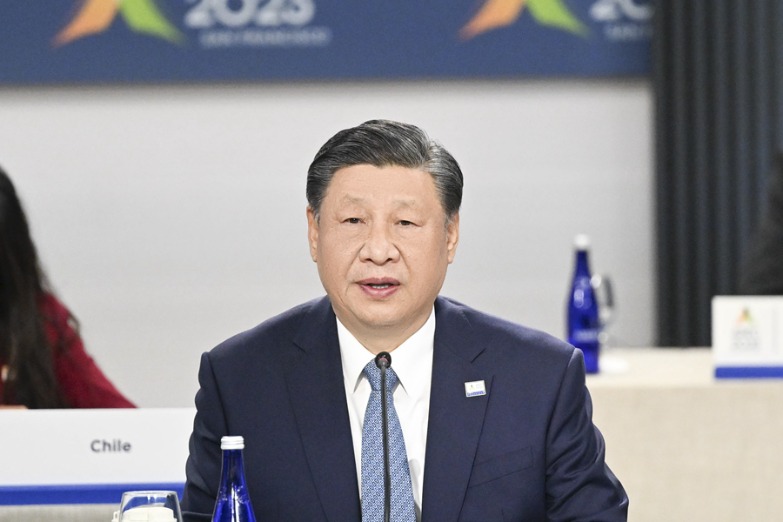
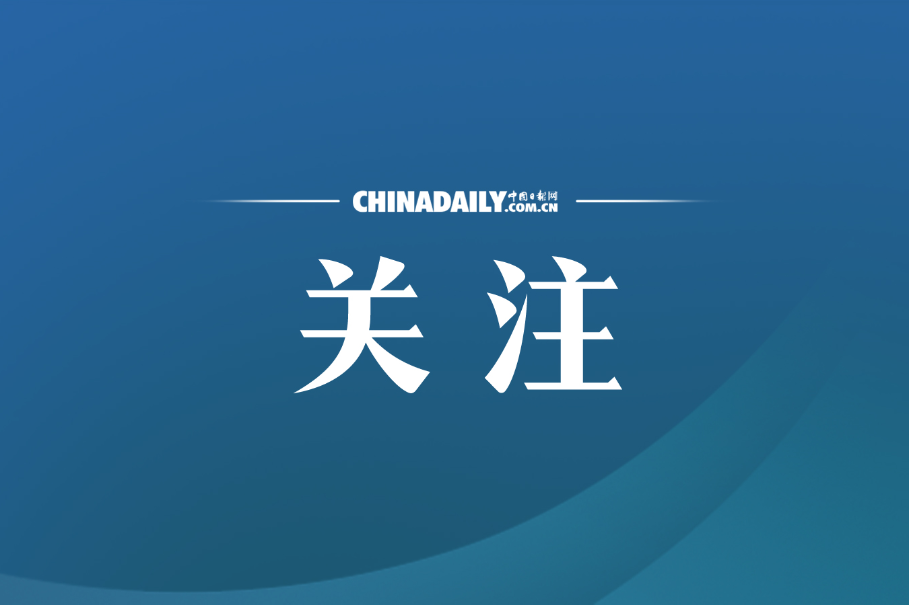
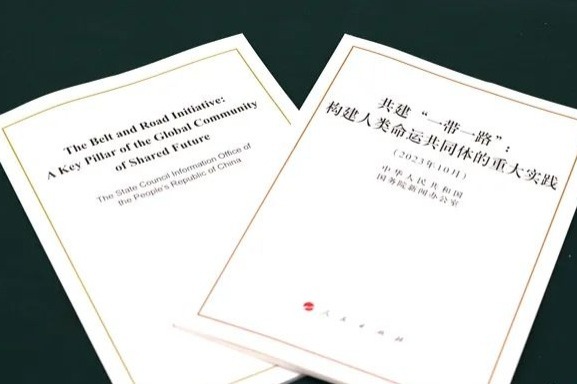
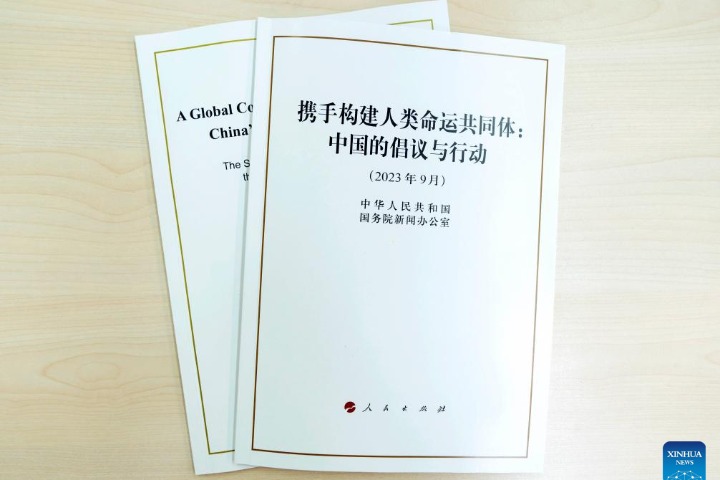
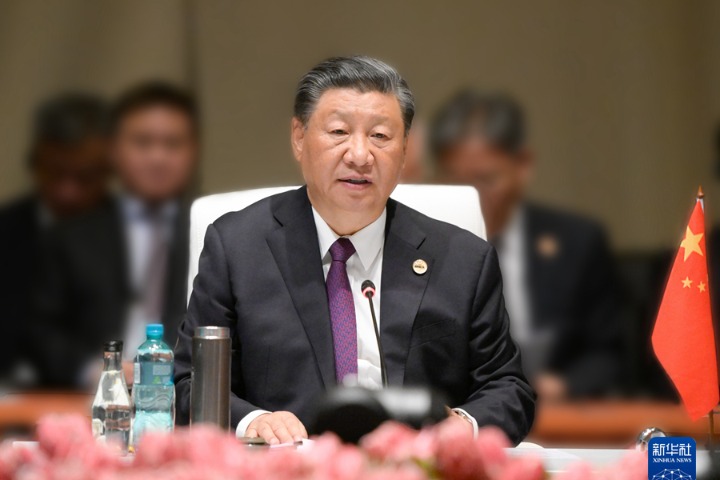



 英语点津微信
英语点津微信 双语小程序
双语小程序